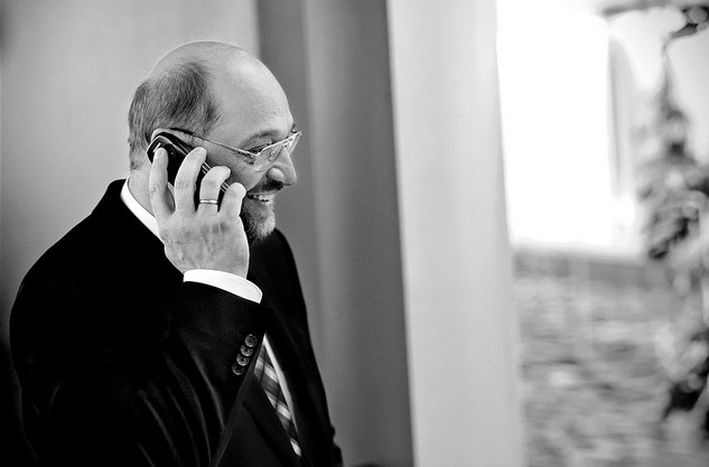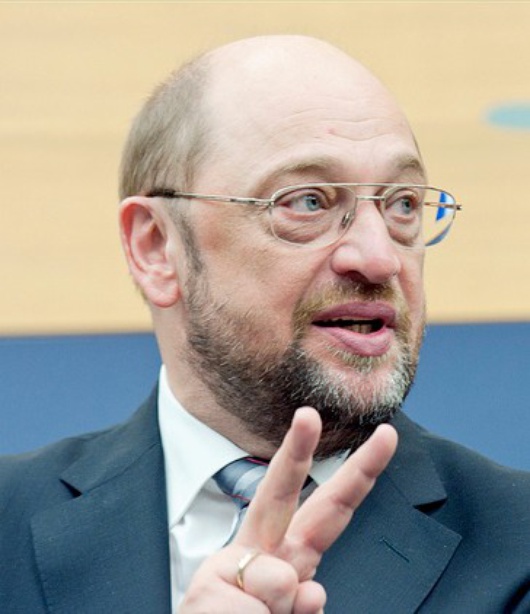
Schulz, new president of European parliament: Martin who?
Published on
Translation by:
Kelly BurtDo you know who the president of the European parliament is? If not, read on: Martin Schulz isn't afraid of courting controversy and is planning to shake up the way Europe is run
Martin Schulz has a new job: on Monday 16 January, he was the chairman of the progressive alliance of socialists and democrats (S&D) of the European parliament; by Tuesday he was the parliament’s president. However, former Italian prime minister Silvio Berlusconi thought that the German would be well-suited for a different occupation: ‘Mr. Schulz, in Italy a film producer is currently making a movie about Nazi concentration camps. I will recommend you for the role of a Kapo (a concentration camp prisoner who supervises other prisoners - ed). You are perfect for it,’ he snapped at Schulz in 2003 after Schulz had sharply criticized Berlusconi's omnipotence in Italian politics and media. Of course, the good Silvio didn't mean any harm by that - it was just a joke, nothing to get upset about.
The British MEP Godfrey Bloom made no effort to create the impression that he had been misunderstood. When Martin Schulz delivered one of his customary, highly-expressive speeches in November 2010, Bloom interrupted him with, ‘Ein Volk, ein Reich, ein Führer’ ('One people, one nation, one leader'). The slogan, part of the third reich's national socialist propaganda, earned the representative for the UK independence party an expulsion from the parliament chamber.
The two scenes are telling: the diverse group in the European parliament continues to stir up national stereotypes. Martin Schulz is also a controversial personality. He delights in the role because ‘uncontroversial’ would equate to inconspicuous, even boring. The German, who was born in Helrath (now Eschweiler) in western Germany in 1955, could be called many things, but boring is not one of them. There has hardly been a parliamentary debate in which Schulz's booming voice hasn't been heard, in which he hasn't made his opinion well and truly known. More than a few people find this arrogant and polemic.
 Before going into politics, he spent a respectable training period as a bookseller and even opened his own bookstore. The brand-new president likes to be filmed there, showing the way he speaks to customers, taking a book in hand here and there. Schulz has become a popular topic for the German media, unsurprisingly seeing as a German finally occupies the highest position of power in all of Europe. However, the majority of Europeans don't know exactly what the president of the European parliament actually does – and neither does the parliament itself. Martin Schulz has been a member of parliament since 1994, and he has made himself heard. This distinguishes him from the bulk of politicians (regardless of which country they are from) because the government of each nation likes to use the European parliament as a place to dispose of disagreeable politicians. The former French justice secretary Rachida Dati could say a thing or two about that.
Before going into politics, he spent a respectable training period as a bookseller and even opened his own bookstore. The brand-new president likes to be filmed there, showing the way he speaks to customers, taking a book in hand here and there. Schulz has become a popular topic for the German media, unsurprisingly seeing as a German finally occupies the highest position of power in all of Europe. However, the majority of Europeans don't know exactly what the president of the European parliament actually does – and neither does the parliament itself. Martin Schulz has been a member of parliament since 1994, and he has made himself heard. This distinguishes him from the bulk of politicians (regardless of which country they are from) because the government of each nation likes to use the European parliament as a place to dispose of disagreeable politicians. The former French justice secretary Rachida Dati could say a thing or two about that.
Schulz declares war: parliament vs state leaders
In contrast, Martin Schulz didn't just volunteer for service in the European parliament –he also had ambitious political goals there. Until now, the role of parliamentary president was more representative in nature and a good post for politicians who wished to live out the final years of their careers quietly. Enter Schulz: ‘I will fight those who believe that more Europe can be achieved with less parliamentarism.’ He continued with a declaration of war: ‘the courage must be found to look for open confrontation with Merkel and Sarkozy.’
Schulz, who considers himself to ‘ hog the limelight’, would like to finally give the European parliament the power which has long been its contractual due. However, the eurocrisis has strengthened the intergovernmental (that is, the interstate) components of the EU, with Merkozy, Juncker and co almost single-handedly saving the euro. One crisis summit follows another, while the parliament sits at the sidelines. Martin Schulz calls this ‘summitisation’ and has a plan to shift the balance of power back in favour of the parliament: Schulz will attend - and take part in - every summit meeting between heads of state and government.
This may not sound particularly spectacular. Nevertheless, it’s worth remembering that according to policy the president of the EU parliament is only entitled to an opening address on such occasions, after which the "big boys" take over – this is a private party! Schulz wants to actually participate and thus finds himself in what he deems to be a win-win situation: either the heads of state and government refuse to let him take part, openly duping the European parliament (which is the only EU institution that is directly elected by European citizens) or else Schulz will be allowed to participate and influence discussions and outcomes.
Next stop: president of the European commission?
Expectations for Schulz run high; he himself has made sure that his accession to office brings a wind of change. The German (allegedly a fan of football club FC Cologne) has two and a half years to prove that he is serious about his promises. One thing is certain: Martin Schulz's career is probably only just getting started; the 56-year-old may have already shown interest in the job of EU commission president Barroso.
Images: main (cc) EP/ Flickr; in text (cc) EP/Flickr; Videos: Bloom/Schulz (cc) euractiv/ YouTube
Translated from Schulz ist neuer EP-Präsident: Martin wer?



